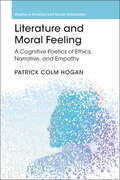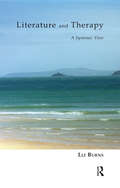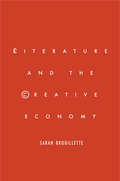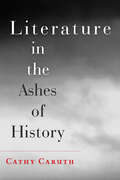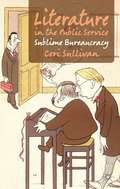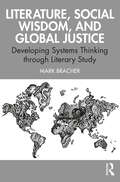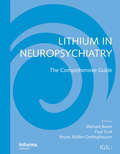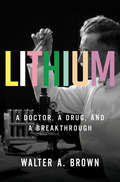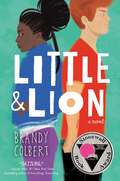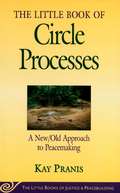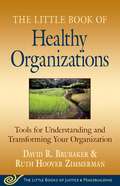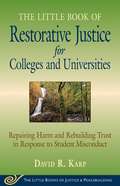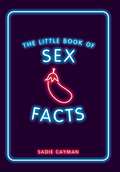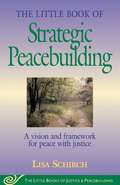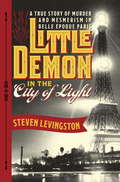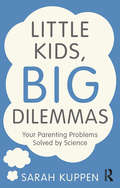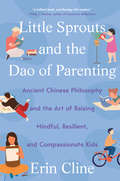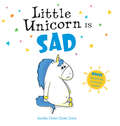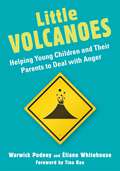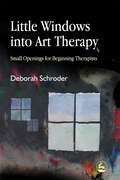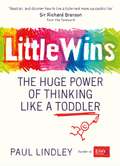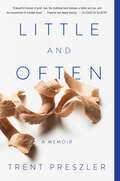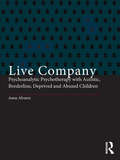- Table View
- List View
Literature and Moral Feeling: A Cognitive Poetics of Ethics, Narrative, and Empathy (Studies in Emotion and Social Interaction)
by Patrick Colm HoganAn influential body of recent work on moral psychology has stressed the interconnections among ethics, narrative, and empathy. Yet as Patrick Colm Hogan argues, this work is so vague in its use of the term 'narrative' as to be almost substanceless, and this vagueness is in large part due to the neglect of literary study. Extending his previous work on universal story structures, Hogan argues that we can transform ill-defined intuitions about narrative and ethics into explicit and systematic accounts of the deep connections between moral attitudes and narratives. These connections are, in turn, inseparable from empathy, a concept that Hogan proceeds to clarify and defend against a number of widely read critiques. In the course of the book, Hogan develops and illustrates his arguments through analyses of global narratives, constructing illuminating ethical interpretations of literary works ranging from Shakespeare to Chinese drama and the Bhagavad Gita.
Literature and Therapy: A Systemic View
by Liz BurnsLiterature and Therapy: A Systemic View is an invitation to the world of literature, drawing us into the creative and imaginative spaces which lie between readers and their choice of novels, plays and poems. In this world, the fundamental importance of emotion and intuition is recognised, as is the power of literature to promote transformations of meaning in every day life and in therapeutic practice. Its potential to contribute depth and diversity to therapists' personal/professional development is explored via literary reflections and qualitative research findings. The author defines the terms literature and therapy broadly, emphasising their mutual relevance in contemporary and historical contexts, acknowledging the richness of literary resources and signposting accessible routes to their use in clinical practice. A systemic view, highlighting relationships, calls to the reader to explore both therapy and literature with fresh eyes, newly motivated thoughts and a lightening heart.
Literature and the Creative Economy
by Sarah BrouilletteFor nearly twenty years, social scientists and policy makers have been highly interested in the idea of the creative economy. This book contends that mainstream considerations of the economic and social force of culture, including theories of the creative class and of cognitive and immaterial labor, are indebted to historic conceptions of the art of literary authorship. What's more, it shows how contemporary literature has been involved in and has responded to creative-economy phenomena, including the presentation of artists as models of contentedly flexible and self-managed work, the treatment of training in and exposure to art as a pathway to social inclusion, the use of culture and cultural institutions to increase property values, and support for cultural diversity as a means of growing cultural markets. Contemporary writers have not straightforwardly bemoaned these phenomena in a classic rejection of the instrumental application of art. Rather, they have tended to explore how their own critical capacities have become compatible with or even essential to a neoliberal economy that has embraced art's autonomous gestures as proof that authentic self-articulation and social engagement can and should occur within capitalism. Taking a sociological approach to literary criticism, Brouillette interprets major works of contemporary fiction by Monica Ali, Aravind Adiga, Daljit Nagra, and Ian McEwan alongside government policy, social science, and theoretical explorations of creative work and immaterial labor.
Literature in the Ashes of History
by Cathy CaruthWhat does it mean for history to disappear?Outstanding Academic Title, ChoiceCathy Caruth juxtaposes the writings of psychoanalysts, literary and political theorists, and literary authors who write in a century faced by a new kind of history, one that is made up of events that seem to undo, rather than produce, their own remembrance. At the heart of each chapter is the enigma of a history that, in its very unfolding, seems to be slipping away before our grasp. What does it mean for history to disappear? And what does it mean to speak of a history that disappears? These questions, Caruth suggests, lie at the center of the psychoanalytic texts that frame this book, as well as the haunting stories and theoretical arguments that resonate with each other in profound and surprising ways. In the writings of Honoré de Balzac, Hannah Arendt, Ariel Dorfman, Wilhelm Jensen, Sigmund Freud, and Jacques Derrida, we encounter, across different stakes and different languages, a variety of narratives that bear witness not simply to the past but also to the pasts we have not known and that repeatedly return us to a future that remains beyond imagination.These stories of trauma cannot be limited to the catastrophes they name, and the theory of catastrophic history may ultimately be written in a language that already lingers in a time that comes to us from the other side of the disaster.
Literature in the Public Service
by Ceri SullivanHistorians and sociologists have been consistently - albeit gloomily - enthralled by Max Weber's model of the inevitable rise of the neurocrat. However, literary critics positively boast that writers, like academics, cannot 'do admin'. While Weber's thesis about the rise of the entrepreneur all fire, individuality, thrust is in tune with what we think literature is about, his thesis about the rise of the bureaucrat is not. Yet 'creative bureaucracy' is not only a euphemism for bending the rules. Literature in the Public Service shows how the public service makes its workers original, taking them beyond an individuated point of view to imagine the perfect public system. Creativity theorists too have swapped the model of solitary inspiration for a managed creative environment. John Milton, Anthony Trollope, and David Hare are examples of how authors work in and write about the public service, during its crisis moments. "
Literature, Social Wisdom, and Global Justice: Developing Systems Thinking through Literary Study
by Mark BracherThis book responds to the pressing and increasingly recognized need to cultivate social wisdom for addressing major problems confronting humanity. Connecting literary studies with some of the biggest questions confronted by researchers and students today, the book provides a practical approach to thinking through, and potentially solving, global problems such as poverty, inequality, crime, war, racism, classism, environmental decline, and climate change. Bracher argues that solving such problems requires “systems thinking” and that literary study is an excellent way to develop the four key cognitive functions of which systems thinking is composed, which are causal analysis, prospection/strategic planning, social cognition, and metacognition. Drawing on evidence-based learning theory, as well as the latest research on systems thinking and its four cognitive functions, the book provides a comprehensive and detailed explanation of how these advanced thinking skills can be developed through literary study, illustrating the process with numerous examples from major works of literature. In explaining the nature and importance of these thinking skills and the ability of literary study to develop them, this book will be of value to literature teachers and students from introductory to advanced levels, and to anyone looking to develop better problem-solving and decision-making skills.
Lithic Technological Systems and Evolutionary Theory
by Nathan Goodale William Andrefsky Jr.Stone tool analysis relies on a strong background in analytical and methodological techniques. However, lithic technological analysis has not been well integrated with a theoretically-informed approach to understanding how humans procured, made, and used stone tools. Evolutionary theory has great potential to fill this gap. This collection of essays brings together several different evolutionary perspectives to demonstrate how lithic technological systems are a byproduct of human behavior. The essays cover a range of topics, including human behavioral ecology, cultural transmission, phylogenetic analysis, risk management, macroevolution, dual inheritance theory, cladistics, central place foraging, costly signaling, selection, drift, and various applications of evolutionary ecology.
Lithium in Neuropsychiatry: The Comprehensive Guide
by Michael Bauer Paul Grof Bruno Müller-OerlinghausenThe definitive textbook on the use of lithium in the treatment of mental disorders, this comprehensive work provides an up-to-date analysis of lithium, including:HistoryClinical applications, including its use for mania, bipolar and schizophrenic disordersUse in special populations, for example in children, the elderly and people with med
Lithium: A Doctor, A Drug, And A Breakthrough
by Walter A. BrownThe remarkable untold story of a miracle drug, the forgotten pioneer who discovered it, and the fight to bring lithium to the masses. The DNA double helix, penicillin, the X-ray, insulin—these are routinely cited as some of the most important medical discoveries of the twentieth century. And yet, the 1949 discovery of lithium as a cure for bipolar disorder is perhaps one of the most important—yet largely unsung—breakthroughs of the modern era. In Lithium, Walter Brown, a practicing psychiatrist and professor at Brown, reveals two unlikely success stories: that of John Cade, the physician whose discovery would come to save an untold number of lives and launch a pharmacological revolution, and that of a miraculous metal rescued from decades of stigmatization. From insulin comas and lobotomy to incarceration to exile, Brown chronicles the troubling history of the diagnosis and (often ineffective) treatment of bipolar disorder through the centuries, before the publication of a groundbreaking research paper in 1949. Cade’s “Lithium Salts in the Treatment of Psychotic Excitement” described, for the first time, lithium’s astonishing efficacy at both treating and preventing the recurrence of manic-depressive episodes, and would eventually transform the lives of patients, pharmaceutical researchers, and practicing physicians worldwide. And yet, as Brown shows, it would be decades before lithium would overcome widespread stigmatization as a dangerous substance, and the resistance from the pharmaceutical industry, which had little incentive to promote a naturally occurring drug that could not be patented. With a vivid portrait of the story’s unlikely hero, John Cade, Brown also describes a devoted naturalist who, unlike many modern medical researchers, did not benefit from prestigious research training or big funding sources (Cade’s “laboratory” was the unused pantry of an isolated mental hospital). As Brown shows, however, these humble conditions were the secret to his historic success: Cade was free to follow his own restless curiosity, rather than answer to an external funding source. As Lithium makes tragically clear, medical research—at least in America—has transformed in such a way that serendipitous discoveries like Cade’s are unlikely to occur ever again. Recently described by the New York Times as the “Cinderella” of psychiatric drugs, lithium has saved countless of lives and billions of dollars in healthcare costs. In this revelatory biography of a drug and the man who fought for its discovery, Brown crafts a captivating picture of modern medical history—revealing just how close we came to passing over this extraordinary cure.
Little & Lion
by Brandy ColbertA stunning novel on love, loss, identity, and redemption, from Publishers Weekly Flying Start author Brandy Colbert. When Suzette comes home to Los Angeles from her boarding school in New England, she isn't sure if she'll ever want to go back. L.A. is where her friends and family are (along with her crush, Emil). And her stepbrother, Lionel, who has been diagnosed with bipolar disorder, needs her emotional support.But as she settles into her old life, Suzette finds herself falling for someone new...the same girl her brother is in love with. When Lionel's disorder spirals out of control, Suzette is forced to confront her past mistakes and find a way to help her brother before he hurts himself--or worse. <br> <b>Winner of the 2018 Stonewall Book Award</b>
Little Book of Circle Processes: A New/Old Approach To Peacemaking
by Kay PranisOur ancestors gathered around a fire in a circle, families gather around their kitchen tables in circles, and now we are gathering in circles as communities to solve problems. The practice draws on the ancient Native American tradition of a talking piece. Peacemaking Circles are used in neighborhoods to provide support for those harmed by crime and to decide sentences for those who commit crime, in schools to create positive classroom climates and resolve behavior problems, in the workplace to deal with conflict, and in social services to develop more organic support systems for people struggling to get their lives together. A title in The Little Books of Justice and Peacebuilding Series.
Little Book of Healthy Organizations: Tools For Understanding And Transforming Your Organization (Little Books Of Justice And Peacebuilding Ser.)
by David BrubakerThe best way to change the world may be one organization at a time. With this ambitious claim, the authors of this highly readable primer provide insightful analysis for evaluating and improving the health of any organization. They advocate a "systems approach," which views organizations as living systems, interconnected in their various departments, and interfacing with their environments. Leaders of organizations from all sectors will find sound advice concerning the four major components of organizations -- their structure, leadership, culture, and environment. Find out: What the classic dispute over "who gets the corner office" is really about. The difference between a good leader and a great one. What new hires may know about an organization that longer-term employees don't. How organizational change and conflict are not only inevitable, but survivable. Each chapter contains examples from the authors' varied experiences with organizational change and conflict, written from a spirited, hopeful approach for creating a better world. A title in The Little Books of Justice and Peacebuilding Series.
Little Book of Restorative Justice for Colleges & Universities: Revised & Updated
by David KarpHere’s a call to colleges and universities to consider implementing restorative practices on their campuses, ensuring fair treatment of students and staff while minimizing institutional liability, protecting the campus community, and boosting morale. From an associate dean of student affairs who has put these models to work on his campus. Restorative justice is a collaborative decision-making process that includes victims, offenders, and others who are seeking to hold offenders accountable by having them (a) accept and acknowledge responsibility for their offenses, (b) to the best of their ability, repair the harm they caused to victims and communities, and (c) work to reduce the risk of re-offense by building positive social ties to the community. David Karp writes in his introduction, "As a student affairs administrator, I have become deeply committed to the concept and practice of restorative justice. I have experienced how it can work given the very real pressures among campus conduct administrators to manage high case loads, ensure fair treatment, minimize institutional liability, protect the campus community, boost morale in a division with high turnover, and help students learn from their mistakes without creating insurmountable obstacles to their future successes. "
Little Book of Sex Facts
by Sadie CaymanShow off your sexpertise with this little book of titillating truths. Having sex is great, and learning about it is too!Discover everything you wished you knew about sex with this pocket-sized cum-pendium of mindblowing facts. Whether you want to impress your friends or learn some new moves, this book equips you with everything you need to become a certified sexpert.Sex is often discussed in hushed tones, but this candid collection of facts pulls no punches. So prepare yourself for a wild ride as this no- holds-barred book answers all the questions you were too afraid to ask. Discover all this and much more! From funny to filthy, this book contains hundreds of jaw-dropping facts that will leave you shocked and amazed.
Little Book of Strategic Peacebuilding: A Vision And Framework For Peace With Justice (Justice and Peacebuilding)
by Lisa ShirchSo we'd all like a more peaceful world-no wars, no poverty, no more racism, no community disputes, no office tensions, no marital skirmishes. Lisa Schirch sets forth paths to such realities.<P><P> In fact, she points a way to more than the absence of conflict. She foresees justpeace-a sustainable state of affairs because it is a peace which insists on justice. Schirch singles out four critical actions that must be undertaken if peace is to take root at any level) - 1.) waging conflict nonviolently; 2.) reducing direct violence; 3.) transforming relationships; and 4.) building capacity. From Schirch's 15 years of experience as a peacebuilding consultant in Africa, Asia, and Latin America. A title in The Little Books of Justice and Peacebuilding Series.
Little Demon in the City of Light
by Steven LevingstonA delicious account of a murder most gallic--think CSI Paris meets Georges Simenon--whose lurid comibation of sex, brutality, forensics, and hypnotism riveted first a nation and then the world.Little Demon in the City of Light is the thrilling--and so wonderfully French--story of a gruesome 1889 murder of a lascivious court official at the hands of a ruthless con man and his pliant mistress and the international manhunt, sensational trial, and an inquiry into the limits of hypnotic power that ensued.In France at the end of the nineteenth century a great debate raged over the question of whether someone could be hypnotically compelled to commit a crime in violation of his or her moral convictions. When Toussaint-Augustin Gouffé entered 3, rue Tronson du Coudray, he expected nothing but a delightful assignation with the comely young Gabrielle Bompard. Instead, he was murdered--hanged!--by her and her companion Michel Eyraud. The body was then stuffed in a trunk and dumped on a riverbank near Lyon.As the inquiry into the guilt or innocence of the woman the French tabloids dubbed the "Little Demon" escalated, the most respected minds in France debated whether Gabrielle Bompard was the pawn of her mesmerizing lover or simply a coldly calculating murderess. And, at the burning center of it all: Could hypnosis force people to commit crimes against their will?
Little Helpers: Animals on the Job!
by Michéle Brummer EverettTake a peek into the lives of service animals to see the wonderful (and sometimes unexpected!) ways they help people in this diverse and inclusive debut picture book. In this book of little helpers, join service animals as they go about their important work. From snakes who give a squeeze when it's time to take medication to Seeing Eye dogs who help their owners cross the street, from llamas who visit children's hospitals to pigs who provide comfort for the elderly, this gentle introduction celebrates special connections between people and animals.
Little Kids, Big Dilemmas: Your parenting problems solved by science
by Sarah KuppenFed up with conflicting advice? This book offers real answers to the following questions and more… Can sleep training harm my baby? Is screen time bad for my child? Is breast always best? Psychologist Dr Sarah Kuppen, expert in early child development, uses her scientific expertise to sort through the hype and give you the facts. Using the latest developmental research, she provides practical tips and solves more than 50 familiar parent questions and dilemmas. Inside you will find advice on: • five ways to tame a tantrum • what to do if your child isn’t talking • the scientific facts on breast versus formula feeding • managing sibling fights and conflict. Little Kids, Big Dilemmas is an essential guide for science-minded parents and childcare professionals alike. Reading this book will allow you to make informed decisions on the big topics for parenting in the early years.
Little Sprouts and the Dao of Parenting: Ancient Chinese Philosophy And The Art Of Raising Mindful, Resilient, And Compassionate Kids
by Erin ClineA philosopher and mother mines classic Daoist and Confucian texts of Chinese philosophy for wisdom relevant to today’s parents. The ancient Chinese philosopher Mencius compared children to tender sprouts, shaped by soil, sunlight, water, and, importantly, the efforts of patient farmers and gardeners. At times children require our protection, other times we must take a step back and allow them to grow. Like sprouts, a child’s character, tendencies, virtues, and vices are at once observable and ever-changing. A practical parenting manual, philosophical reflection on the relationship between parent and child, and necessary response to modern stereotypes of Eastern parenting, Little Sprouts and the Dao of Parenting reconsiders cultural definitions of success and explores how we might support and nourish young people. Engaging deeply with foundational Daoist and Confucian thinkers, Georgetown philosopher Erin Cline offers accessible, provocative musings on key parenting issues. She reveals how ancient Chinese philosophers encourage surprisingly modern values—a love of nature and of learning, mindfulness in everyday interactions, an embrace of disabilities and diversity, and the power of performing rituals with reflection—and relates these to concrete parenting practices, whether celebrating special occasions or finding a child’s unique talents and gifts. Little Sprouts shows how—through the nurturing efforts of parents, grandparents, aunts, uncles, friends, and teachers—we can strengthen innate virtues of compassion, generosity, and individuality in our own tender sprouts. With an engaging and intuitive approach, Cline offers a balanced philosophy that helps us grow into better parents of joyful, fulfilled children.
Little Unicorn Is Sad (Little Unicorn #3)
by Aurélie Chien Chow ChineMr. Men meets The Color Monster--with a unicorn!--in the third book in this series that taps into the current trend of books about childhood emotions, this one about sadness.A little unicorn's rainbow-colored mane shifts to a single color when he's feeling a particularly strong emotion. It seems like a storm comes over him when he's sad, and his mane turns deep blue. But when he repeats a breathing exercise, the clouds clear and his rainbow returns--and if he ever feels sad again, he'll know just what to do.This distinctive series about coping with strong feelings integrates a breathing exercise into the story, making these books perfect for parents who are seeking practical tools for their children. With accessible, mainstream artwork and unicorn character appeal, each book focuses on just one emotion, allowing parents and children to dive deeper into individual moods. Little Unicorn is Shy will release at the same time.
Little Volcanoes: Helping Young Children and Their Parents to Deal with Anger
by Tina Rae Éliane Whitehouse Warwick PudneyYoung children can erupt like little volcanoes when they are feeling angry. It can be overwhelming and difficult to deal with, and can produce angry feelings in the parent or caregiver too. This book is packed with advice and strategies for those working with children under five on how to understand and manage anger in children, and also how to help their parents or caregivers to deal with anger. The authors outline the different reasons children may feel angry so that their emotions can be fully understood, and offer strategies to combat negative feelings and minimize outbursts. These include putting in place behavioural boundaries and helping a child to feel secure. Simple activities and exercises are also given to help children and adults to express their anger positively. In addition, a selection of poems and stories will help adults to pass on the lessons of the book to children. This practical and accessible book will be of essential use to any professional helper of parents and young children such as early childhood educators, caregivers and social workers, as well as to parents themselves.
Little Windows into Art Therapy: Small Openings for Beginning Therapists
by Deborah SchroderNewly qualified art therapists often feel daunted by the challenge of actually being face-to-face with a client and are unsure how to progress after the first image has been created. In this honest and encouraging book, Deborah Schroder explains how art can provide openings into therapeutic relationships and create a safe space for exploring issues and concerns. Drawing on her own development as an art therapist and her extensive experience of supervising new therapists and students, Schroder provides practical advice on encouraging nervous or reluctant clients, or those unfamiliar with art therapy, to benefit from artmaking. She argues for a two-way sharing of art between therapist and client, exploring not only how specific techniques can be put into practice, but also how they benefit the therapeutic relationship. Providing guidance on moving into deeper work, exploring and containing particular emotions, and bringing the therapeutic relationship to a close, this book is invaluable to new art therapists at all stages of their relationships with clients.
Little Wins: The Huge Power of Thinking Like a Toddler
by Paul Lindley'Read on, and rediscover how to live a fuller and more successful life' SIR RICHARD BRANSON, from the forewordThere are some 400 million people worldwide whose creativity, imagination and determination put the rest of us to shame. They are experts in their field, despite having no experience to speak of. Once, you were one of them too. They are toddlers - and they hold the key to unlocking our creative potential as adults.In Little Wins: The Huge Power of Thinking Like a Toddler, Ella's Kitchen founder Paul Lindley reveals the nine characteristics and behaviours that we can all learn from recalling our toddler selves. From attention-grabbing tactics that would humble most marketing experts to the art of thinking divergently, Lindley shows how much we've lost in getting old - and how we can get it back. Never mind growing up; it's time we grew down.
Little and Often: A Memoir
by Trent Preszler“Little and Often is a beautiful memoir of grief, love, the shattered bond between a father and son, and the resurrection of a broken heart. Trent Preszler tells his story with the same level of art and craftsmanship that he brings to his boat making, and he reminds us of creativity’s power to transform and heal our lives. This is a powerful and deeply moving book. I won’t soon forget it.” —Elizabeth GilbertTrent Preszler thought he was living the life he always wanted, with a job at a winery and a seaside Long Island home, when he was called back to the life he left behind. After years of estrangement, his cancer-stricken father had invited him to South Dakota for Thanksgiving. It would be the last time he saw his father alive.Preszler’s only inheritance was a beat-up wooden toolbox that had belonged to his father, who was a cattle rancher, rodeo champion, and Vietnam War Bronze Star Medal recipient. This family heirloom befuddled Preszler. He did not work with his hands—but maybe that was the point. In his grief, he wondered if there was still a way to understand his father, and with that came an epiphany: he would make something with his inheritance. Having no experience or training in woodcraft, driven only by blind will, he decided to build a wooden canoe, and he would aim to paddle it on the first anniversary of his father’s death.While Preszler taught himself how to use his father’s tools, he confronted unexpected revelations about his father’s secret history and his own struggle for self-respect. The grueling challenges of boatbuilding tested his limits, but the canoe became his sole consolation. Gradually, Preszler learned what working with his hands offered: a different perspective on life, and the means to change it. Little and Often is an unflinching account of bereavement and a stirring reflection on the complexities of inheritance. Between his past and his present, and between America’s heartland and its coasts, Preszler shows how one can achieve reconciliation through the healing power of creativity.
Live Company: Psychoanalytic Psychotherapy with Autistic, Borderline, Deprived and Abused Children
by Anne AlvarezChildren whose minds as well as bodies have been damaged by the intrusions of sexual abuse, violence or neglect, and others, quite different, who are handicapped by their own mysterious sensitivities to more minor deprivations, may experience a type of black despair and cynicism that require long-term treatment and test the stamina of the psychotherapist to the utmost.In Live Company, Anne Alvarez reflects on thirty years' experience of treating autistic, psychotic and borderline children and adolescents by the methods of psychoanalytic psychotherapy. Central to the book is the moving story on an autistic child's long struggle between sanity and madness, in which the author describes the arduous journey that she as therapist and he as patient made towards new understanding and his partial recovery.Modern developments in psychoanalytic theory and technique mean that such children can be treated with some success. In the book the author discusses these developments, and also describes some of the areas of convergence and divergence between organicist and psychodynamicist theories of autism. Particularly important is her integration of psychoanalytic theory with the new findings in infant development and infant psychiatry. This has enabled her to formulate some new and exciting ideas and speculate on the need for some additions to established theory.Anne Alvarez has produced a professionally powerful and englightening book, drawn from her extensive experience as a child psychotherapist at the Tavistock Clinic, which will be of interest to all professionals involved with children and adolescents as well as anyone interested in madness and the growth of the mind.
